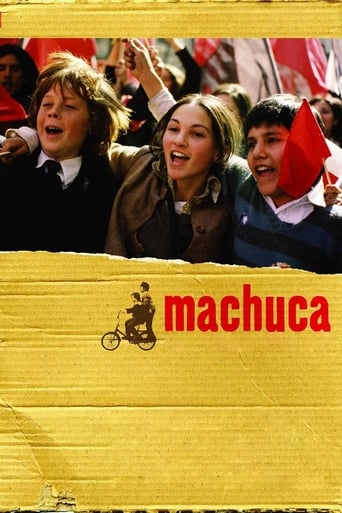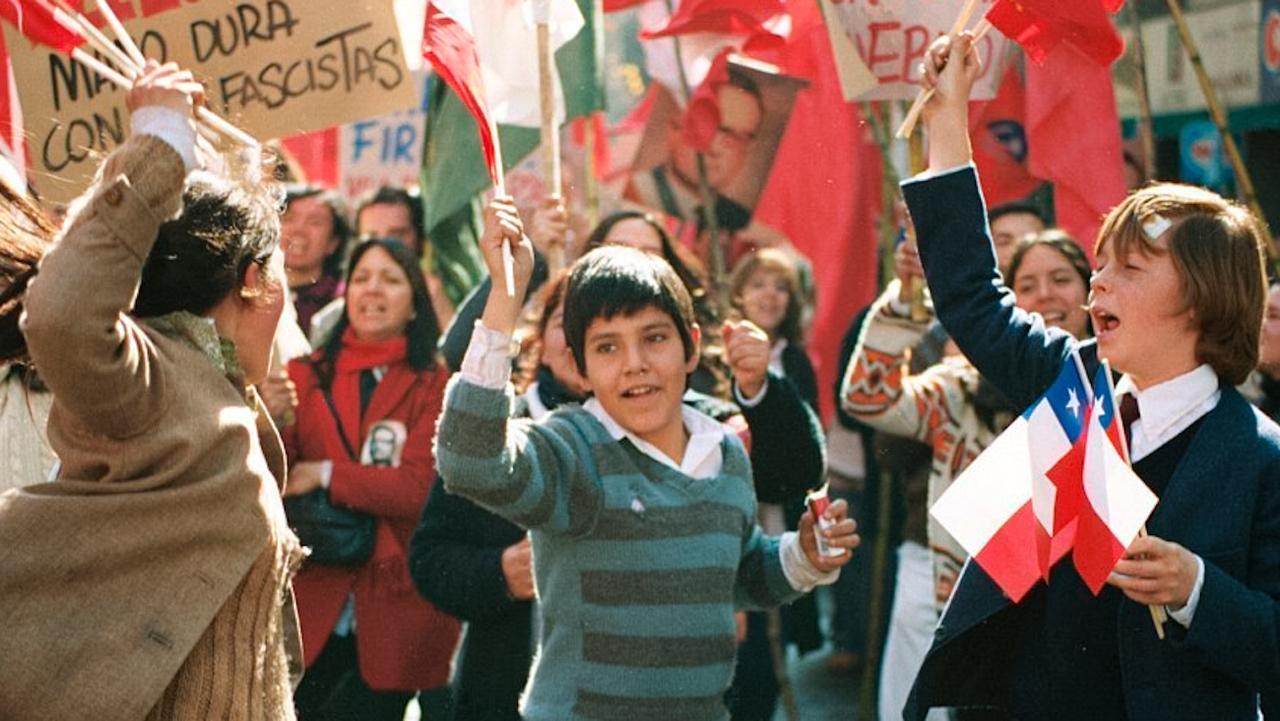Paulina Palero
I haven't seen a movie that seemed so honest and real in a long time. I believe that the actions taken by the characters are natural for them, the children take the decisions and act as children would act in real life. There are many movies now days where the actions of the characters don't seem to fit the character they are unnatural and sometimes even betray the character themselves, but not in Machuca, every action has a reason to be. This could have been a really bad movie if it had been done just a little bit different. There are not amazing shoots there are not long monologues that seem unnatural and every character is constant throughout the movie. The movie takes place at the end of the presidency of Salvador Allende and at the end of the democracy of Chile.Gonzalo and Pedro, the main character of the movie, become friends almost immediately, even though the they are from different social classes, Gonzalo's family supporting the right side and Pedro's family supporting the left side, the kids still become friends by fighting their bullies. This shows how children don't really care about the material stuff or how much money someone has, as long as they can have a fun with someone they will become friends. Gonzalo and Pedro might have very different lives but they understand each other and are intrigued with each other lives. Gonzalo is welcomed in Pedro's family. Gonzalo has his first reality shook when he goes to Pedro's house and sees how the other side of Chile lives. Gonzalo's reaction to Pedro's life is natural. He doesn't feel completely comfortable because he is used to way nicer things but he is not scared either, he is mature enough to understand that Pedro's family is not like his and he accepts it and doesn't let this difference come between his friendship with Pedro. He even decides to help them sell Chilean flags during protests. Whit this simple action Gonzalo gets a better understanding of the situation in Chile, even better than his mom who is shown supporting the right side and even being mean to Gonzalo's crush, Silvana. It is the adult who start to drive Gonzalo and Pedro apart. The families of Gonzalo and Pedro's school do not like the people of lower resources to go to the same school as they "privileged" children. Finally, the cruelty of the revolution drives them apart in a horrible way, Gonzalo tries to help his friend but he is in danger by doing so and ends up running away. We can see the regret of Gonzalo for ruing away but there is nothing he could have done but we know that he will be the change Chile will need in the future. The movie does a great job at showing both sides of the Chile revolution and at making it all seem real. The camera movements, the different shots, the actions of the characters with a reason behind them all help the movie be as realistic as possible and to be able to show both sided of the revolution. I truly enjoyed this movie and the story it tells. It is a movie that helps understand better the situation Chile went through.
FilmCriticLalitRao
"Machuca" is an excellent film for all ages made by Chilian filmmaker Andres Wood.The best thing which can be said about "Machuca" is that it is one the those rare films which are a superb visual statement on human condition.It is true that young children will surely have a lot to learn from this film but adults can also learn a thing or two if they make up their minds to reduce conflicts in the world.Some of the major issues discussed in this film are about friendship,sexual awakening,class differences,trouble at home,trouble with church and trouble with military.In this film it is nice to see how two young boys tackle above mentioned themes with courage,determination and dignity.A moral lesson to be learn from "Machuca" is that weak souls are strong in dealing with all kinds of emotional adversities.Although films featuring young protagonists are a common trend in the annals of world cinema nevertheless Muachuca remains a totally different film as it is about self discovery,knowing one's limitations and keeping one's head straight even in the times of adversities.This is a must see film for all admirers of serious cinema,meaningful films and Latin American history.
gradyharp
Andrés Wood is a highly regarded Chilean filmmaker, a man unafraid to take on controversial issues and present them in a manner that is revelatory to his audience, whether that audience is in Chile or other South American countries - or in Europe or North America. In MACHUCA he transports us to the year 1973 in Chile when Pinochet's military coup overthrew Allende's socialist 'democracy'. Knowing that there remains a divided opinion of this period of time, a time when Allende supporters who could not escape the country were murdered or placed in detention camps as political prisoners, Woods sensitively recreates this period through the eyes of children from the populace divided by the middle class and the poor, a technique which works on every level.Saint Patrick's School for boys in Santiago is headed by a kind priest/principal Father McEnroe (Ernesto Malbran) and the rich to middle class uniformed boys include one 'strawberry faced', quiet, chubby Gonzalo Infante (Matías Quer) whose family is of means but has issues of covert infidelity with the mother (Aline Küppenheim) and father (Francisco Reyes). The Allende government is shaky, and in an attempt to appease the poor class, Saint Patrick's School takes on students from the shantytowns to 'democratize' education. Among these new students is Pedro Machuca (Ariel Mateluna) who seems to be a loner but soon becomes the brunt of the rich kids' prejudice. Gonzalo befriends Pedro and gradually the two form a strong bond which leads to each of the boys learning about their separate families and life styles: Gonzalo's life of luxury dazzles Pedro while Pedro's humble shack houses warm family that Gonzalo envies. The friendship leads to a close examination of the schism of racism and political clashes brought into sharp focus as the military coup changes everything. Only friendship remains intact in a dramatically tested fashion.Andrés Woods marries the political and the human aspects of this chaotic time in Chile and offers us insights into the ongoing changing governments of South America. His script (which he wrote with Eliseo Altunaga, Roberto Brodsky and Mamoun Hassan) is spare leaving space for much of the story to be told by observing the interaction of his two main characters with their associates. The result is a deeply moving film, an opportunity to observe the tenuous times of a period most of us barely understand. Highly Recommended. Grady Harp
Donnie Zuo
This is almost the first Chilean film I've seen, and I was totally blown away by it.Seeing the three children rejoicing in a parade, one may already know that it's a serious historical film --- at least I did, especially when I related it to "Turtles can fly", another historical epic from children's view in the same year. However, you don't need to know very much about Chilean history to enter this story --- as long as you are familiar with the universal phrase of civil war.The three children brought forward incredibly amazing acting, which is quite different from the way American young stars do. They are rawer, looser and more original. Also it's obvious that the makers put a lot of efforts in cinematography to show us surprisingly poetic and childish views of the period. The story, though full of twists and turns, is as natural and convincing as one can be. It doesn't force your tears. They'll just come unaffectedly.After all, the pain of war is universal, and so is the darkness of society. Those issues may be far beyond our concerns, but the way people dealt with it is still worth thinking twice.


 AD
AD


